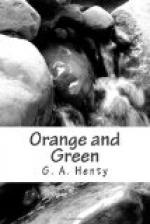The British were some time before they were ready for the attack, but at ten o’clock the whole army stood in close order, ready to advance.
The first to move forward were those who were to carry the bridge. The Irish guns, which still remained intact, opened upon them, but they pressed forward along the bridge to the broken arch, and, with less trouble than had been anticipated, threw the platform across it. Instead of rushing forward at once, the grenadiers stood behind their breastwork and hurled their grenades at the Irish grenadiers, who stood in close order on the opposite edge.
These, however, stood their ground, and hurled their grenades with great effect into the column. One of these exploded against the English breastwork and set it on fire. It at once blazed up. A strong west wind was blowing, and drove the smoke and flames into the faces of the English grenadiers, who for some time strove in vain to extinguish the flames, notwithstanding the heavy fire which the defenders poured into them. They had at last to fall back, and the Irish, sallying from behind their breastwork, pulled down the burning timbers on to the bridge, which was soon in flames.
The other divisions of the English army, finding that the grenadiers on the bridge made no progress, did not attempt to perform their part of the work, and finally the whole retreated to their camp.
That evening, another council of war was held. Matters now looked desperate, and the fact that the enterprise had, this time, failed owing to the hesitation of the troops to push forward to the attack of the enemy, made the prospect appear more hopeless. Nevertheless, in spite of the opposition of Generals Ginckle and Mackey, the council determined that one more attempt should be made, and that this should be carried out at daylight next morning, in the hopes of taking the Irish by surprise.
It was accordingly given out that the army would retreat in the morning, and the heavy guns were withdrawn from the batteries. Saint Ruth, who was convinced that Athlone could not be taken, and who had spent the greater portion of his time in entertaining the ladies and gentry of the neighbourhood with balls and fetes, fell into the trap, and, contrary to the opinion and advice of the Irish generals, recalled from the town the regiments which had marched in that morning, and replaced them with only three battalions of inferior troops. The Irish officers remonstrated warmly, but Saint Ruth, to show his disdain for their opinions, invited a large party of ladies and gentlemen to an entertainment in the evening.
In the night, the British army prepared for the attack. The commanders of the respective divisions all led their troops in person.
The garrison of the town were all asleep. In Saint Ruth’s camp the festivities were over, and the general and his officers had retired. The Irish sentinels, who noted the movement in the British camp, supposed that they were mustering to retreat, and thus the three British columns drew up inside the town wall, in readiness to advance, without a notion of their purpose being entertained on the opposite side of the river.




